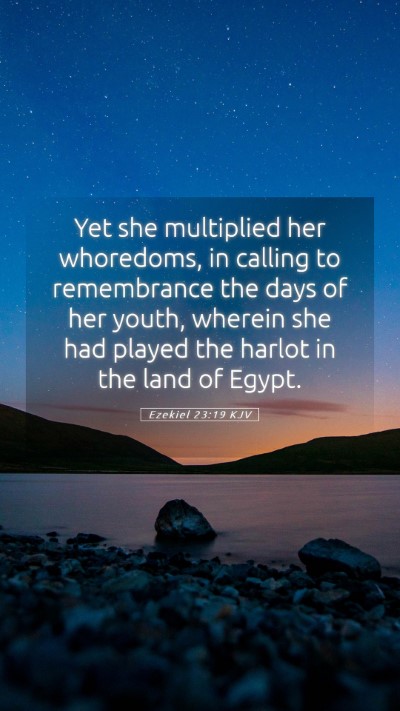Ezekiel 23:19 - Meaning and Interpretation
Ezekiel 23:19 states, "Yet she multiplied her whoredoms, in calling to remembrance the days of her youth, wherein she had played the harlot in the land of Egypt." This verse is part of a prophetic narrative that uses allegorical language to describe the unfaithfulness of Israel and Judah, likened to two sisters, Oholah and Oholibah.
Contextual Background
The prophetic book of Ezekiel contains vivid imagery and symbolism that illustrate God's message to the people of Israel. In this chapter, Ezekiel highlights the spiritual adultery of the Israelites. The references to "whoredoms" indicate idolatry and infidelity towards God. This form of language is frequent in the prophetic texts, where the relationship between God and His people is portrayed as a marital covenant.
Commentary Insights
- Matthew Henry's Commentary: Henry emphasizes that the "whoredoms" represent both the literal idolatries practiced by Israel and a deeper spiritual betrayal of loyalty to God. The mention of Egypt recalls the earlier days of oppression and sinfulness, suggesting a longing or nostalgia for a past that should be left behind.
- Albert Barnes' Notes: Barnes elaborates that the verse highlights the tendency of Israel to return to its former sins, illustrating how the memories of past experiences, although negative, can lure people back to destructive habits. Barnes underscores the theme of forgetfulness regarding God’s grace and faithfulness in times of deliverance.
- Adam Clarke's Commentary: Clarke reflects on the nature of Israel's rebellion, illustrating how the people continuously abandoned Yahweh to pursue other deities. This verse serves as a reminder of the consequences of turning away from divine teachings and succumbing to past sinful behaviors.
Spiritual Lessons
From Ezekiel 23:19, several vital lessons can be gleaned:
- The Danger of Nostalgia: The inclination to romanticize past experiences can lead believers to forsake their current path. Understanding Scripture means recognizing such tendencies and resisting call-backs to sin.
- Faithfulness to God: The passage encourages ongoing commitment to God, illustrating that unfaithfulness can lead believers away from blessings and into destructive patterns of behavior.
- Idolatry's Impact: The metaphor of whoredom illustrates the severe consequences of idolatry, urging individuals to evaluate what they may be placing before their relationship with God.
Application of Ezekiel 23:19
This verse prompts profound reflection for contemporary believers. Here are some applications:
- Self-Examination: Regularly assess your life for any forms of spiritual unfaithfulness. Consider what modern "idols" may distract from your commitment to God.
- Community Accountability: Engaging in Bible study groups can help foster accountability. Discussing Scripture insights can lead to collective growth and increased spiritual dedication.
- Prayer for Strength: Seek prayer and guidance to avoid the spiritual pitfalls suggested in this verse. Ask God to help you remain faithful and to recognize any tendencies toward idolatry.
Cross References
This verse relates to several other scriptures that deal with the themes of idolatry and spiritual infidelity:
- Hosea 1:2: The message of Hosea similarly reflects the unfaithfulness of Israel.
- Jeremiah 3:6-10: These verses convey God's dismay at His people's unfaithfulness.
- Revelation 2:4-5: A New Testament reminder to return to one's first love echoes the themes in Ezekiel.
Conclusion
In summary, Ezekiel 23:19 highlights the perils of spiritual unfaithfulness, using powerful metaphors to illustrate the consequences of turning away from God. Understanding this scripture not only enriches personal faith but also enhances community discussion in Bible study contexts, promoting deeper insights into the nature of God's covenant with His people.


